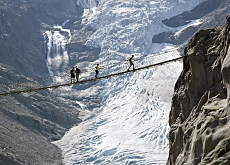Environmentalists and aid agencies join forces

Aid agencies, environmental groups and the scientific community have formed a loose alliance to reduce the impact of natural disasters caused by climate change.
The Red Cross is leading efforts to apply the latest knowledge on extreme weather events to improve disaster preparedness.
“People are confronted with floods when they do not expect them. They are confronted with hurricanes and heat waves of an intensity they’ve never seen before,” said Madeleen Helmer, of the International Federation of Red Cross and Red Crescent Societies.
Helmer heads the Red Cross’s Climate Centre, which was set up only four years ago and is based in The Hague.
Speaking at the International Disaster Reduction Conference in Davos, she said the effects of climate change had “posed a new challenge to the way we organise our humanitarian system”.
However, she said aid organisations were still reluctant to start a dialogue with scientists.
“They [scientists] are used to working in models and large time scales – forecasting for 2050 or 2080 – and general vulnerability mapping of areas of a country getting drier or wetter,” she told swissinfo.
“That kind of information is not helpful for us, so we need to be more specific and clear about what we need. The scientific community should understand our needs and our way of communicating to people,” she added.
The federation wants to make better use of seasonal storm warnings. Helmer regretted that the aid organisation’s offices in the Americas had not paid enough attention to the updates issued in August last year.
These would have enabled them to prepare better for Katrina and the other devastating hurricanes that hit the region.
Tsunami
While there was much talk in Davos about strengthening the tsunami early warning system in the Indian Ocean, environmental organisations reported progress on the introduction of sustainable measures to prevent devastation of coastal areas.
The Swiss-based World Conservation Union (IUCN) is working with governments and non-governmental organisations in the region to conserve and, where necessary, restore eco-systems such as mangrove forests.
The IUCN’s chief scientist, Jeffrey McNeely, told the conference studies had proven that “coastal areas with intact, dense mangrove forests…suffered fewer losses and less damage to property than areas where mangroves had been converted to shrimp ponds or other uses.”
He said governments and the private sector were finally realising that the economic value of mangroves was much higher than the short-term gain won by converting them into shrimp farms.
“Mangroves carry out appropriate ecosystem services,” McNeely told swissinfo. “It includes things like nurseries for fisheries, helping to collect sediment along the coast, helping to ensure that there is no saltwater intrusion into fresh water. These are all services which do have an economic value.”
He also said the habitats now being restored could already be effective barriers to storms and tidal waves within the next four to five years.
“Mangroves will come back by themselves but we can work with countries to accelerate their return. Natural processes are sometimes slow and humans can intervene in a positive way if it’s done properly.”
Helmer concluded that cooperation efforts were key to “sharpening scientific research”.
“It makes it far more applicable to the way we work with people so it’s a benefit for both sides.”
swissinfo, Dale Bechtel in Davos
The conference (August 27-September 1) is jointly organised by the United Nations International Strategy for Disaster Reduction, the UN Educational, Scientific and Cultural Organization (Unesco), the Global Alliance for Disaster Reduction and the Global Disaster Information Network.
The main sponsor is the Swiss Agency for Development and Cooperation.
The International Federation of Red Cross and Red Crescent Societies has announced the launch of the first phase of a multi-hazard early warning system for Aceh in Indonesia.
Aceh was one of the areas worst hit by the Indian Ocean tsunami of December 2004.
The announcement came on the final day of the Davos conference on Friday.
The Red Cross/Red Crescent Climate Centre brings together scientific data on climate change and operational knowledge from the humanitarian field. Its aim is to improve disaster risk reduction for people living in disaster-prone areas.
The five-year “Mangroves for the Future” programme was launched by the World Conservation Union last year. It aims to work with communities to restore ecosystems in severely degraded coastal zones as part of post-tsunami reconstruction efforts.

In compliance with the JTI standards
More: SWI swissinfo.ch certified by the Journalism Trust Initiative













You can find an overview of ongoing debates with our journalists here . Please join us!
If you want to start a conversation about a topic raised in this article or want to report factual errors, email us at english@swissinfo.ch.